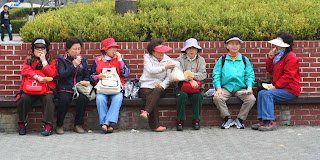So I recently realized that I have written a lot about different things I have done, places I've seen and challenges I've faced but I haven't really written about my day to day life and why being a foreigner, especially an American with blonde hair and blue eyes, in South Korea can be AWESOME! So I decided to make a list of some frequent day to day occurrences that absolutely rock.
1. My students bow to me. If you've never been bowed to repeatedly and by large numbers of kids you really don't know how awesome it really is. Bowing is a very large part of Korean culture and you are constantly bowing to say good morning, good-bye, or even just to say hi to nearly everyone you see. Therefore, I do my fair share of bowing but generally speaking I only have to 'drop a 90' or do a full bow to teachers who are much older than me, my principal and my vice-principal. A 45 degree bow suffices for most other teachers and people I interact with and if I have already seen them and greeted them that day a head nod bow will suffice. Since the bowing ritual is determined by the social hierarchy my students are expected to do a full bow to me all the time. Granted some of the wiser kids know I'm American and skate around it but still a large portion of my kids constantly bow to me in class, in the hallways, in the lunchroom and even in town and I must say it makes you feel like a rockstar.
2. Constant Compliments. Since Koreans do not have a lot of diversity in their gene pool they are fascinated by foreigners looks. I do have some qualms about the compliments I receive because most of them are rooted in many Koreans desire to appear Western, which is a very unattainable beauty ideal. The rates of plastic surgery in South Korea are astronomical and the most common surgery is a double eyelid surgery that aims to make your eyes look more Western. These statistics upset and frustrate me because I would love for my female Korean students to feel beautiful and understand that different cultures have different perceptions of beauty. Yet, on a day to day basis receiving compliments all the time is rather nice. I am constantly told I look like a doll, have a beautiful, small head, am really tall, etc. by my students, co-teachers or just people I run into in town. I was even once asked by a student if this was my real face. There also is a downside to the constant attention though because Koreans are also very critical and open about their criticisms regarding one's appearance. Therefore, I also have to suffer through entire breakfast conversations about how tired I look or how red my face gets when I exercise.
3. Everyone wants to talk to you. Since there are not a lot of foreigners outside of the major cities in South Korea I am sometimes one of the first foreigners people have ever had a chance to talk to. Therefore everyone is very eager to find out more about me. Koreans are also extremely eager to practice speaking English, even if they only know the word hi, so they are always going out of their way to say hello and make me feel welcomed. Teachers in my school have been so welcoming and eager to spend time with me, which makes the adjustment to Hwacheon much smoother. Additionally, people on the street frequently stop me to ask me about myself, particularly if I am with a Korean because many times these people have more limited English and need a third party to translate. Suprisingly, this has even occurred in Seoul, which is a very international city.
4. You get free things or special privileges. Korean culture is a gift-giving culture in which you express love for the people around you by offering them gifts. This in turn makes Korean a very welcoming and hospitable country full of generous people. Since most Koreans are extremely proud of their country and culture they are eager to give foreigners the five star treatment and expose the foreigners to new aspects of Korea. This frequently results in being offered free dishes at restaurants, free snacks from convenience stores, and other signs of affection. It also once resulted in me being escorted three stores down the street to a fancy Western Style toilet because the owner of the restaurant I was in didn't want me to use a squatty potty. Although I sometimes feel guilty accepting all of these perks they also do make me feel much more supported, cared for and welcomed in the country where I will be living and working in for a year, which is a pretty invaluable perk.
I'm sure there are other perks I could think of but I believe this list will suffice for now.















